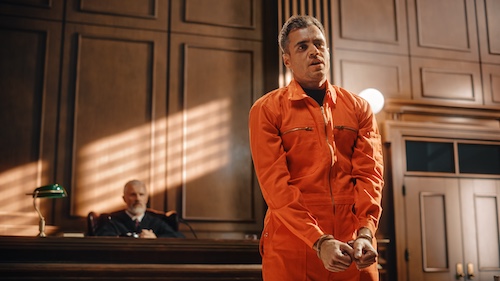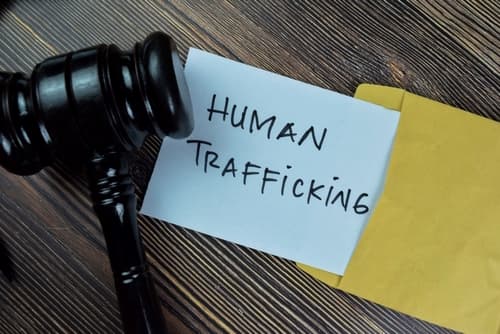Accused of Trafficking a Minor? What You Need to Know Now
Being accused of trafficking a minor is one of the most serious charges under both Texas and federal law. These cases involve child sex trafficking, labor trafficking, or the exploitation of minors through force, fraud, or coercion. Even a false accusation can lead to arrest, federal investigation, and long-term consequences. If law enforcement claims you recruited, transported, or provided a child for a commercial sex act or forced labor, you need to act fast. Understanding the law and securing a skilled human trafficking defense attorney is the first step in protecting your rights and freedom.
In this blog, you will learn what qualifies as trafficking a minor under Texas and federal law, common situations that lead to these accusations, the serious consequences involved, and why working with an experienced human trafficking defense lawyer is essential to protect your future.
What is Considered Trafficking a Minor in Texas and Federal Law?
Trafficking a minor is prosecuted aggressively at both the state and federal level. Laws focus on protecting children from commercial sexual exploitation, forced labor, and other forms of abuse, regardless of the child’s consent or the offender’s intent.
Definition Under Texas Law
Texas Penal Code § 20A.02 makes it a crime to knowingly traffic a child for labor or any commercial sex act. The law applies to anyone who recruits, transports, harbors, or provides a minor for illegal purposes. Consent from the child is not a defense, and the use of force, fraud, or coercion is not required when the victim is under 18.
Charges may involve child sex trafficking, child labor trafficking, or involuntary servitude. Related offenses often include child pornography, domestic servitude, and sexual exploitation. Even indirect involvement, such as receiving financial benefit from trafficking activities, can lead to prosecution.
Definition Under Federal Law
Federal law, under 18 U.S. Code § 1591, criminalizes the trafficking of minors for commercial sex acts. It is illegal to recruit, entice, transport, or maintain a child for any form of commercial sexual activity. The law does not require proof that the trafficker used force, fraud, or coercion if the child is under 18.
Federal prosecutions involve agencies such as the FBI, Department of Justice, and Homeland Security. Convictions carry harsh penalties, including mandatory minimum prison sentences of 10 years to life. Federal cases often use terms like trafficked children, child sex trafficking victims, and sexually exploited minors to describe those involved.
Common Scenarios That Lead to Accusations
Accusations of trafficking a minor can arise in many situations, often without clear evidence or intent.
Misunderstood Relationships
Some cases begin with a personal relationship between an adult and a teenager. A person may believe the minor is older or that the relationship is lawful. If there is any exchange of money, gifts, or shelter in connection with a sex act, it can be viewed as child sex trafficking. Law enforcement and child welfare professionals often assume exploitation even without clear proof of force, fraud, or coercion.
Social Media and Online Communication
Social media and messaging platforms are common areas where accusations start. Conversations involving minors about sex, travel, or money can trigger investigations. Law enforcement may pose as minors online to identify suspected child traffickers. Even without meeting in person, messages or photos can lead to charges involving sexual exploitation or child pornography.
Family Involvement and Custody Disputes
Family members or legal guardians may report each other during custody battles. Allegations of familial trafficking or child abuse may be used to gain an advantage in court. These reports often involve claims of forced labor, domestic servitude, or commercial sex involving minor victims. Accusations may come from former partners, legal guardians, or relatives.
Financial Help or Shelter for Minors
Providing shelter or money to a runaway or a child in need can be misunderstood as involvement in child trafficking. If a minor engages in a commercial sex act while staying with someone, the person offering help may face charges. Accusers may claim the adult benefited or failed to prevent the sex act, triggering an arrest.
Law Enforcement Stings and False Accusations
Some accusations result from undercover sting operations targeting suspected incidences of child sex trafficking. Officers may use fake ads or profiles to attract responses. Even if the accused never intended to meet a minor or believed they were speaking with an adult, they can be charged. Others face false accusations from children or adults with motives tied to revenge, misunderstanding, or family dysfunction.
Understanding the Gravity of the Charge
Being accused of trafficking a minor carries severe legal, personal, and social consequences that begin long before trial.
A Serious Federal and State Crime
Trafficking a minor is treated as a first-degree felony in Texas. Under federal law, it is prosecuted under federal law. These laws classify child sex trafficking and labor trafficking as severe forms of human trafficking. A conviction can lead to decades in prison, with mandatory minimum sentences starting at 10 years and going up to life.
Mandatory Sex Offender Registration
A conviction for trafficking a minor often requires lifetime registration as a sex offender. This applies even when no physical sexual act occurred. Registered sex offenders face restrictions on housing, employment, and contact with children. The label alone creates permanent damage to personal and professional life.
Federal Investigations and Multi-Agency Involvement
Accusations often lead to investigations involving local law enforcement, the FBI, Homeland Security, and child welfare professionals. These agencies may share data, conduct surveillance, and seize digital devices. A person accused may not realize the full scale of the investigation until arrest. Charges can include related offenses like child pornography, sexual exploitation, or abuse of child victims.
Social Stigma and Public Records
Even without a conviction, the public impact of being charged with trafficking of children can be permanent. Arrest records, mugshots, and media coverage remain online. Employers, neighbors, and family members may assume guilt. The accused may lose custody of their children or face protective orders.
Increased Penalties in Related Cases
Additional penalties apply when the case involves repeated offenses, injury to the minor, or crimes linked to child prostitution, forced labor, or commercial sexual exploitation. Cases involving multiple children, international borders, or suspected organized activity are often prosecuted more aggressively and may include charges tied to debt bondage or involuntary servitude.
Immediate Steps to Take If Accused
Taking fast and smart action is critical if you are accused of trafficking a minor. The first hours and days after the accusation can shape the entire outcome of your case.
Do Not Talk to Law Enforcement Without a Lawyer
Remain silent until you have a human trafficking defense attorney present. Speaking without legal protection can lead to statements being used against you. Even if you believe you are innocent or misunderstood, anything said can be taken out of context or misinterpreted. Law enforcement officers are trained to gather evidence, not to clear your name.
Hire a Human Trafficking Defense Attorney
You need a defense attorney with specific experience in trafficking of children and federal investigations. These cases often involve digital evidence, undercover operations, and cooperation between state and federal agencies. A qualified human trafficking defense lawyer understands how to handle charges involving sex trafficking, child pornography, or commercial sexual exploitation. Early legal action can help protect your rights and prevent additional charges.
Gather and Preserve Evidence
Save any messages, call logs, travel records, receipts, or digital conversations that may show your side of the story. Evidence can disappear quickly or be altered. Share all information with your attorney so they can assess what may help in court. A clear timeline can support your defense and weaken the claim that you recruited, transported, or harbored a minor for illegal activity.
Avoid the Alleged Victim and Their Family
Do not attempt to contact the person making the accusation. This includes their family members, friends, or anyone close to the situation. Contact may lead to new charges such as witness tampering or intimidation. Let your attorney handle all communication. If there is a court order in place, violating it may result in arrest and harsher penalties.
Stay Off Social Media
Anything posted online can be collected and used as evidence. Do not comment about the case, the accuser, or any details related to the investigation. Even private messages are not protected. Social media activity may be misinterpreted as guilt or used to build a narrative of intent.
Prepare for a Long Process
Trafficking accusations move slowly through the legal system. Investigations can last months. Media coverage and public pressure may increase over time. Stay calm, follow legal advice, and focus on defense. A strong response from the beginning is key to protecting your future.
Contact an Experienced Human Trafficking Defense Attorney Today!
If you’ve been accused of trafficking a minor, your next steps are critical. Federal and state prosecutors pursue these charges aggressively, and the consequences can last a lifetime. Do not try to handle this alone.
Contact us at 832-326-2932 for a free case consultation today!





